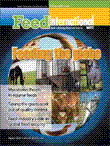An interdependent world is requiring companies to become larger to serve its growing needs, Carl Hausmann, President and CEO of Bunge North America said at the opening session of the World Agricultural Forum (WAF), May 18 in St. Louis, Mo.
“The world is pushing companies to become bigger,” he said.
Hausmann and other panelists argued for less restrictive trading rules that would reduce the cost of food worldwide, even though in the short run, they are not optimistic that will be achieved.
It’s also important that agriculture become an active player in the global climate change meeting that will occur the end of this year in Copenhagen, he said, noting that “agriculture is a producer of greenhouse gas.”
Hausmann argued against the concept of more expensive production of food based on the notion of “food miles,” as it is far less expensive to grow and ship food based on the concept of comparative advantage.
David Morgan, President of Syngenta Seeds Inc., said that “agriculture is part of the solution about climate change.”
He added, though, that Syngenta, a major global seed company, often faces hostility on science and biotechnology issues. He continued that Syngenta is developing seeds that can produce crops with fewer resources such as water, and seeds for specific needs, such as those for biofuel. While all panelists criticized export subsidies and other methods of restricting trade, J.B. Penn, chief economist for John Deere, said substantial progress has been made in decoupling grain prices from production policies in both the U.S. and European Union, a move to what’s called green box payments from trade-distorting amber box ones.
“The U.S. has made a whole series of concessions,” he added.
Professsor Nuhu Hatibu, CEO of The Kilimo Trust, East Africa, said that he supports the abolition of food aid in favor of investment. He also noted, when asked about organic agriculture, that exports of organic food from Africa to Europe “were the first to suffer” during the global economic crisis.
James B. Bolger, former Prime Minister of New Zealand, Chairman of the WAF, and moderator of the session called “The Agricultural Challenge During the Global Financial Crisis,” said production agriculture is going to face an enormous challenge in the years ahead in that food production must double between now and 2050 to meet the needs of a growing population.
For the challenge to be met, open markets are required, he said. Bolger argued for policies that would bring the 3 billion people on the bottom economic rung into customers for companies and countries.
One of the enemies of the required agricultural investment in developing nations, speakers said, is political instability. Kilimo noted that the Congo alone could feed all of Africa, but after 40 years of independence, Africa can’t feed itself.
Penn noted, however, that prior to the economic crisis, global agriculture enjoyed a sustained period of productivity, and diets were improved by millions of people.
Subscribe to:
Post Comments (Atom)






No comments:
Post a Comment